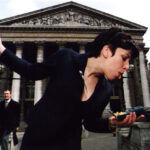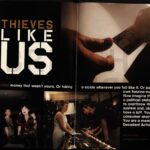Inspired by Fluxus and a distaste for the puritanism of the ‘downsizers’ and the class blindness of the ‘buy nothing’ crowd, Decadent Action was born in the mid-1990s. It was created as a faux ‘consumer terrorist’ revolutionary group that would use a kind of capitalist ju-jitsu to turn the strength of credit against the system. Yes there were some simple economics involved in the arguments made by the ‘group’ in its newsletter The Decadent or in interviews in the Observer, the Face, Wired or the New York Times, but I didn’t expect to be taken seriously.
As it was, the Decadent Action argument that an excess of credit would eventually crash the financial system did kind of come true in 2008. There were plenty of economists and anarchists willing to say ‘we told you so’ and refer back to Decadent Action. But the whole thing was an elaborate art project that acted in a similar way to the Neoist Alliance, London Psychogeographical Association or Association of Autonomous Astronauts. Indeed, we often shared a cocktail.
Decadent Action also drew praise from and comparison with ‘culture jammers’ in the early days of online activism, as well as being cited by everyone from Naomi Klein to academics. Then there was the invention of World Phone in Sick Day, which attracted the ire of the CBI, some really odd meetings with what we can only assume were undercover cops, and courtship from Channel 4.
British Airways staff phoned in sick en masse, as did Irish police. Decadent Action got the blame. Or took the blame. You decide.
There was eventually a Decadent Action documentary, shot lavishly on film for Channel 4, who were impressed with the group’s credentials and its adherence to a champagne lifestyle. This was fully-automated luxury communism before it was a thing. Decadent Action détourned the Dolcé and Gabbana logo, got called Prada Meinhof in the press and made one Mirror TV reviewer want to smash his set in.
Of course, this being Decadent Action, the documentary Gluttony was not all it seemed, especially as some of the parts were played by actors. Ever feel like you’ve been cheated?
Decadent Action eventually ‘sold’ Phone in Sick Day (which by then was on every media calendar) to US allies RTMark, who then became the Yes Men. The group existed for a while longer, sending out newsletters to sometimes confused anarchists about monetary policy and the control of the Bank of England. They then retired to an island they had bought with their dubious credit cards.



